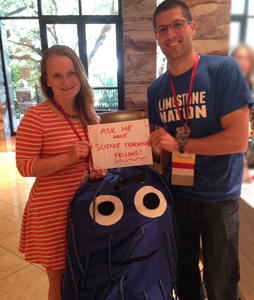2016 ASM Science Teaching Fellows
About STF Course
ASM Science Teaching Fellows Course
The ASM Science Teaching Fellows Course is a 5-month development opportunity to help prepare doctoral-trained individuals for science teaching positions at a variety of non-doctoral institutions. The experience is fast-paced, intense, and interactive. This highly focused training experience combines in-depth webinars, pre- and post-webinar assignments, structured mentoring, and a community of practice.
Science Teaching Fellows will:
- Learn the best practices in curriculum development, student-centered learning and pedagogies of engagement for scientific teaching
- Be part of an online community of fellows, mentors and facilitators with exclusive access to interactive webinars, readings and skill-building activities presented by experts in the field
- Enjoy professional development opportunities in course design and assessment, active learning strategies and teaching philosophy development
- Expand their scientific network by working directly with peers and scientists
The application period for the 2017 Science Teaching Fellows Course will begin November, 2016. To learn more about the program, please click here.

Meet a Science Teaching Fellow

Laura MacDonald, Ph.D., Hendrix College (STF Fellow 2012-2013)
"As a graduate student at an RO1 institution, I had limited teaching resources and opportunities, but knew that my long term goal was to work at a primarily undergraduate institution. I feel incredibly fortunate to have been accepted to the ASM-BWF Science Teaching Fellows program. Through STF, I learned how to create a student-centered learning environment centered around a set of well-developed learning objectives. STF was my first introduction to formative and summative assessment and ultimately led me to the ASM Conference for Undergraduate Educators (CUE). Following graduate school, I immediately taught two full courses and feel strongly that my STF experience was the reason my first semester teaching was successful. I also developed strong relationships with others in my STF cohort which has led to collaborations in education research. I cannot say enough about the importance STF has had on pursuing and meeting my goals as an educator."

Veronica A. Segarra, Ph.D., High Point University (STF Fellow 2012-2013)
"Through the BWF ASM STF program I learned how one can actively, systematically and objectively approach one's teaching skills as to make them more effective and successful. I had always limited myself to think that a good teacher was generally the product of lots of time and experience in the classroom. While I continue to think experience helps make a good teacher, I now know that the road to excellence in teaching can be smoothened and shortened if one approaches one's teaching as one would an experiment at the bench. For this reason, my understanding of teaching has broadened, which has ultimately allowed me to approach my teaching in new ways. I have also become part of a thriving community of educators and peers that I can go to for help and advice."

Ines Rauschenbach, Ph.D., Rutgers University (STF Fellow 2013-2014)
"I have had the opportunity to participate in the Science Teaching Fellowship that is offered through ASM. I had applied for this program to increase my knowledge and practice in course design as well as creating learning outcomes and assessment projects. After the workshops, for the first time, I had finally understood how to write good learning outcomes and create meaningful activities and assessments. The support and feedback that I had received was meaningful and motivating. The program instilled confidence that I can change the way that we deliver the content of a course to a more student-centered approach. Working closely with my teaching assistants, we have now created an inquiry-based learning environment and assessment has shown that students are better able to apply and explain concepts present in the lab. The best part of the program is that you not only learn more about assessment, learning outcomes, and course design, you become part of a teaching community."
